

Automation | Automatisation. IoT - Internet des objets. Quantum Computing Is Coming. What Can It Do? How Smart Glasses Are Creating a View to the Future. Change has Changed in the 4th Industrial Revolution (4IR) Beyond the focus on the technologies that are fundamental to the 4th Industrial Revolution (4IR) – there is an equally significant shift occurring in how leaders lead and managers manage.
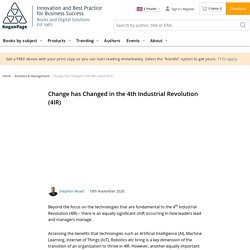
Accessing the benefits that technologies such as Artificial Intelligence (AI), Machine Learning, Internet of Things (IoT), Robotics etc bring is a key dimension of the transition of an organization to thrive in 4IR. Management and Leadership in the 4th Industrial Revolution: Capabilities to Achieve Superior Performance (November 2020) by Stephen Wyatt. The State Of Industry 4.0 In 2020. Part 1 in a series on the findings of an Industry 4.0 adoption study by The MPI Group It was in 2011 at Hannover Messe that the German government first announced a new initiative to digitize manufacturing – an initiative known as Industry 4.0.
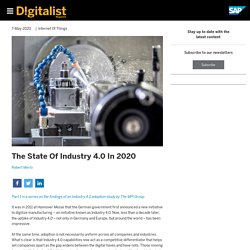
Now, less than a decade later, the uptake of Industry 4.0 – not only in Germany and Europe, but around the world – has been impressive. At the same time, adoption is not necessarily uniform across all companies and industries. What’s clear is that Industry 4.0 capabilities now act as a competitive differentiator that helps set companies apart as the gap widens between the digital haves and have nots. The Unicist Evolutionary Approach to the 4th Industrial Revolution. Welcome!

Welcome to the Scientific Collaboration Space. Australian business leaders unprepared for the Fourth Industrial Revolution: KPMG. Industry 4.0 readiness survey. In working to keep up with the pace of technological change, business leaders are also beginning to appreciate the need to nurture a culture of lifelong learning, equipping their workforces with the skills necessary to succeed in the future.
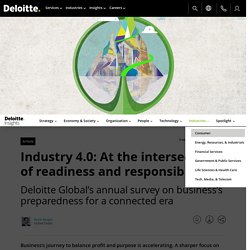
And thanks in part to pressure from customers and employees, executives are expressing deep concern about climate change and resource scarcity, topics that were on few C-suite agendas just a couple of years ago. In Deloitte Global’s third annual survey of more than 2,000 C-suite executives across 19 countries, we examined the intersection of readiness and responsibility to see how leaders are balancing this transition to Industry 4.0—capitalizing on advanced technologies to help propel their businesses forward while acting in a more socially responsible way, particularly in the area of environmental stewardship.
When strategy leads, success follows. Your Industry 4.0 Journey. What the Top CES Takeaways REALLY Mean for Your Brand. Australian execs in the dark on Industry 4.0 skills. Upskilling the ageing workforce for industry 4.0. Against the backdrop of an ageing workforce, the war for talent is at crisis point as employers around the world fight for a shrinking pool of talent.
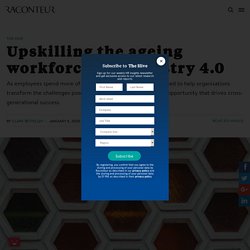
In the US, nearly three quarters of employers (73 percent) have increased pay in a bid to attract new staff, according to the 2019 Benefits Strategy & Benchmarking Survey from global insurance brokerage, Arthur J. Gallagher & Co. Meanwhile in the UK, the talent war has been so devastating that businesses have in the last year alone been forced to spend more than £4.4 billion on temporary staff, recruitment fees and training to drive productivity and plug the skills gap, according to The Open University’s Business barometer report 2019. The ageing workforce – a growing opportunity Almost one in three UK workers is now aged over 50, according to the September 2018 report ‘Becoming an age-friendly employer’ by Business in the Community and The Centre for Ageing Better.
Industry 4.0: Risks and Opportunities [Infographic] Are we ready for the Fourth Industrial Revolution? The Fourth Industrial Revolution (4IR) has come of age.
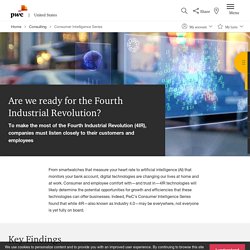
Smart products are flooding the market and entering our workplaces. The fourth industrial revolution in agriculture. Do all cows’ faces look the same to you?
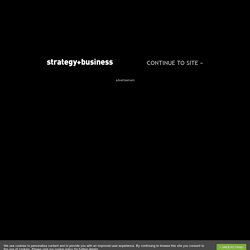
They don’t to systems powered by artificial intelligence (AI). Bovine facial recognition technology, developed through a strategic partnership between Cargill and an Irish technology company called Cainthus, equips barns and fields with smart cameras that can identify each cow in a herd in seconds based on facial features and hide patterns. How the Fourth Industrial Revolution is Changing Work and Education. Industry 4.0: It Takes A Village. Industry 4.0 promises to create the Fourth Industrial Revolution and digitally transform manufacturing in discrete and process industries.
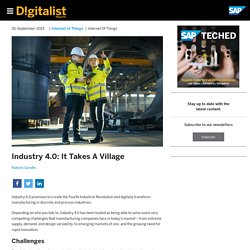
Depending on who you talk to, Industry 4.0 has been touted as being able to solve some very compelling challenges that manufacturing companies face in today’s market – from extreme supply, demand, and design variability, to emerging markets of one, and the growing need for rapid innovation. Challenges The digital transformation required to enable Industry 4.0 – automation, integration, and optimization of processes and manufacturing lines – especially in an existing facility, often requires several solutions, as well as onboarding and connectivity of numerous pieces of equipment (including brownfield), often from numerous asset vendors. This often results in: The players. Society needs a reboot for the Fourth Industrial Revolution. Society’s operating system needs an upgrade.
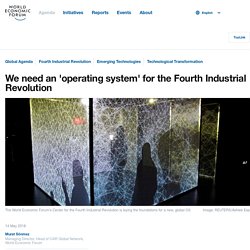
The model we have been using is simply not up to the challenges of the Fourth Industrial Revolution. A new era is unfolding at breakneck speed. It has huge potential to address some of the world’s most critical challenges, from food security, to reducing congestion in big cities, to increasing energy efficiency, to accelerating cures to the most intractable diseases. But it also raises a host of social and governance issues that need addressing. Given the speed and scale of the changes, and the slow pace of processes defining governance models to handle them, present solutions to these questions are being rapidly superseded.
Blockchain applications: Where does blockchain stand? The Industry 4.0 manufacturing revolution. Deloitte and Forbes Insights would like to thank the following for sharing their time and expertise: Flemming Besenbacher, chairman of Carlsberg Natasha Buckley, senior manager, Deloitte Center for Integrated Research Mark Cotteleer, managing director, Deloitte Center for Integrated Research Harold Goddijn, chief executive officer and cofounder, TomTom Mindy Grossman, president and chief executive officer, WW International, Inc.
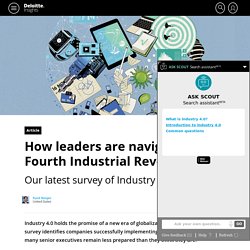
André Hoffmann, vice chairman, Roche Holding Ltd., and chairman, Hoffmann Global Institute for Business and Society Advisory Board Yoky Matsuoka, chief technology officer, Nest Labs Timothy Murphy, senior manager, Deloitte Center for Integrated Research. Industry 4.0 paradox: Overcoming disconnects. Cognitive supply chains are the future: here's why you need one. As complex algorithms, machine-learning and artificial intelligence become mainstream, it seems inevitable that they’ll disrupt global supply chains. Companies, whether they’re Maersk or GSK, Jaguar Land Rover or Tesco, increasingly need distribution and inventory management systems that are self-learning, predictive, adaptive and intelligent; so-called cognitive supply chains. “We’re at a unique moment in the evolution of the supply chain where advanced technologies have matured enough to match the proliferation of data. There is a current transition among leading companies where they’re aggressively reinventing from the inside out,” explains Jesus Mantas, managing partner for global strategy at IBM Global Business Services.
The Industry 4.0 manufacturing revolution. How To Flourish In Industry 4.0 (Part 1) Call it a “Forrest Gump moment:” an instance of being in the right place at the right time for no other reason than just plain luck. A “Forrest Gump moment” is based upon Tom Hanks’ character in the movie “Forrest Gump,” a guy who always seemed to be in the right place at the right time, meeting Presidents Kennedy, Johnson, and Nixon at critical points in American history.
I too have had a Forrest Gump moment in meeting President Reagan. However, my deeper Forrest Gump moments have been my long association with the history of analytics. Understading the DNA of DARQ. Mapping the Fourth Industrial Revolution. Extended Reality (XR) for Business 2018. A Strategist’s Guide to Industry 4.0. Industry 4.0 challenges on the path to digital transformation. Industry 4.0 – How to Boost your Company's Agility, Flexibility & Innovativeness. Future of Manufacturing 2018 - Raconteur. Industry 4.0, smart factory, and connected manufacturing. The smart factory represents a leap forward from more traditional automation to a fully connected and flexible system—one that can use a constant stream of data from connected operations and production systems to learn and adapt to new demands. The new frontier of manufacturing systems Connectivity within the manufacturing process is not new.
Yet recent trends such as the rise of the fourth industrial revolution, Industry 4.0,1 and the convergence of the digital and physical worlds—including information technology (IT) and operations technology (OT)—have made the transformation of the supply chain increasingly possible. Shifting from linear, sequential supply chain operations to an interconnected, open system of supply operations—known as the digital supply network—could lay the foundation for how companies compete in the future. In this paper, we explore how these capabilities integrate to enable the act of production. A brief look at the digital supply network Defining the smart factory. Industry 4.0 demystified. Amid digital disruption, five principles can help companies find tangible value in Industry 4.0 solutions. For years, companies have pursued lean manufacturing principles and the productivity improvements they promise. Yet now that lean methods are truly ingrained in the DNA of many businesses, classical lean tools are losing some of their edge.
The very success of these approaches means that further improvements are increasingly marginal and tougher to achieve. My three decades at Disney taught me not to fear automation. Industry 4.0 for Technology, Media and Telecommunications. What sets Frontrunner TMT companies apart from the rest? Blockchain beyond the hype: What is the strategic business value? Companies can determine whether they should invest in blockchain by focusing on specific use cases and their market position. Blockchain Special Report: What to Expect in 2018. Society needs a reboot for the Fourth Industrial Revolution.
Blockchain : promesses et limites d'une révolution. Bitcoin fut, initialement, une réponse à la crise de 2008 - une crise systémique, crise de confiance en les institutions financières.- Les développeurs qui ont posé les premières « briques » de son code informatique ont, d’emblée, visé à développer un système ouvert, transparent, hautement sécurisé, apte à se passer d’intermédiaire. Ils voyaient juste. Sans surprise, ce sont les banques qui, les premières, ont investi dans cette technologie. Les plus avancées aujourd’hui ? Half the world’s population is still offline. Here’s why that matters. Last month scientists at Tufts University announced that they had created a sensor that can be mounted on a tooth to track diet quality and make tailored nutritional recommendations.
Only 5 per cent of Australian companies are changing how they work to capitalise on AI. The New Automation Is Smart, Fast, and Small. At most companies, the profile of a large-scale technology initiative has looked astonishingly similar over the last several decades. Décryptages. La transformation du travail à l'ère 4.0 - Les Affaires. Formula One is a testing ground for Industry 4.0, as Simon Roberts, chief operating officer of McLaren Racing, explains. - Deloitte Review. Industry 4.0: Are you ready? - Deloitte Review. A Strategist’s Guide to Industry 4.0. Avoiding the Hidden Hazards of Industry 4.0 - Boston Consulting Group.
Far too often, companies yield to the dazzle of Industry 4.0 without considering hidden costs of implementation and without weighing the possibility that low-tech solutions might handle some processes more simply and inexpensively. The seductive power of Industry 4.0 solutions is on full display when production technology experts gather for peer meetings. The social safety net is not ready for the next tech revolution. Here’s why. How 5G will change the world. It is not an easy time to be an internationalist, to seek global solutions to global problems amid what feels like one of history’s periodic inclinations toward divisiveness. The Industry 4.0 manufacturing revolution. Why we need to embrace the tech backlash – World Economic Forum. The Fourth Industrial Revolution will bring a massive productivity boom. Why the Automation Boom Could Be Followed by a Bust.